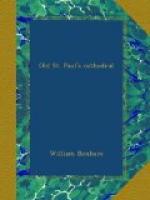One keeps on finding benefactions of this sort. In 1370 one John Hiltoft’s executors handed over some money which the Chapter employed in repairing some ruined houses; but they took care to establish a chantry of one chaplain to celebrate Divine service daily in St. Dunstan’s Chapel for the soul of the said John.
We have already made mention of the chantry which Henry IV. founded to the memory of his father and mother. Bishop Braybrooke on that occasion gave a piece of ground, part of his palace, 36 feet by 19 feet, for the habitation of the priests attached to this chantry. And King Henry, we are told, “gave to the Dean and Chapter, and their successors, for ever, divers messuages and lands, lying within the City of London, for the anniversary of the said John, Duke of Lancaster, his father, on the 4th day of February, and of Blanch, his mother, on the 12th day of September yearly in this church, with Placebo and Dirige, nine Antiphons, nine Psalms, and nine Lessons, in the exequies of either of them; as also Mass of Requiem, with note, on the morrow to be performed at the high altar for ever; and moreover to distribute unto the said Dean and Chapter these several sums, viz., to the Dean, as often as he shall be present, three shillings and fourpence; to the principal canons, twenty pence (to the sum of 16_s._ 8_d._); to the petty canons, ten shillings; to the chaplains, twenty shillings; to the vicars, four shillings and eightpence; to the choristers, two shillings and sixpence; to the vergers, twelvepence; to the bell-ringers, fourpence; to the keeper of the lamps about the tomb of the said duke and duchess, at each of their said anniversaries, sixpence; to the Mayor of London for the time being, in respect of his presence at the said anniversaries, three shillings and fourpence; to the Bishop of London, for the rent of the house where the said chantry priests did reside, ten shillings; and for to find eight great tapers to burn about that tomb on the day of the said anniversaries, at the exequies, and mass on the morrow, and likewise at the processions, masses, and vespers on every great festival, and upon Sundays at the procession, mass, and second vespers for ever. And lastly, to provide for those priests belonging to that chapel on the north part of the said tomb, a certain chalice, missal, and portvoise [Breviary] according to the Ordinale Sarum; as also vestments, bread, wine, wax, and glasses, and other ornaments and necessaries for the same, and repairs of their mansion.” A few years later another chantry was founded at the same altar for the soul of Henry IV. himself.
As years went on, the provision for all these Chantries being found inadequate to maintain them, some were united together, and thus, at their dissolution in the first year of Edward VI., it was found that there were only thirty-five, to which belonged fifty-four priests.
In addition to the Chantries were the Obits held by the Dean and Canons, particular anniversaries of deaths. They varied in value according to the donors’ endowment from 4_l._ to 10_s._ Dugdale gives a long list of them.




